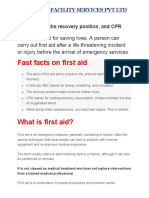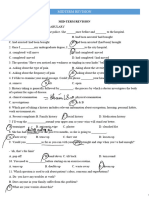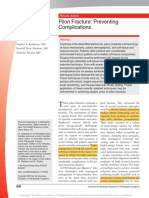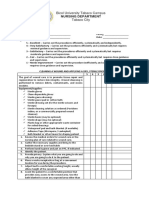0 ratings0% found this document useful (0 votes)
66 viewsFirst Aid 10
First Aid 10
Uploaded by
Oswaldo TorresFirst aid is the initial care provided for an illness or injury until medical treatment can be accessed, and involves techniques like cleaning wounds, applying pressure to stop bleeding, and CPR or rescue breathing for non-breathing victims. The document defines first aid terms, provides guidance on assessing injuries and treating wounds, burns and other conditions, and emphasizes the importance of first aid skills for emergency situations.
Copyright:
© All Rights Reserved
Available Formats
Download as PPTX, PDF, TXT or read online from Scribd
First Aid 10
First Aid 10
Uploaded by
Oswaldo Torres0 ratings0% found this document useful (0 votes)
66 views16 pagesFirst aid is the initial care provided for an illness or injury until medical treatment can be accessed, and involves techniques like cleaning wounds, applying pressure to stop bleeding, and CPR or rescue breathing for non-breathing victims. The document defines first aid terms, provides guidance on assessing injuries and treating wounds, burns and other conditions, and emphasizes the importance of first aid skills for emergency situations.
Original Title
FIRST AID 10
Copyright
© © All Rights Reserved
Available Formats
PPTX, PDF, TXT or read online from Scribd
Share this document
Did you find this document useful?
Is this content inappropriate?
First aid is the initial care provided for an illness or injury until medical treatment can be accessed, and involves techniques like cleaning wounds, applying pressure to stop bleeding, and CPR or rescue breathing for non-breathing victims. The document defines first aid terms, provides guidance on assessing injuries and treating wounds, burns and other conditions, and emphasizes the importance of first aid skills for emergency situations.
Copyright:
© All Rights Reserved
Available Formats
Download as PPTX, PDF, TXT or read online from Scribd
Download as pptx, pdf, or txt
0 ratings0% found this document useful (0 votes)
66 views16 pagesFirst Aid 10
First Aid 10
Uploaded by
Oswaldo TorresFirst aid is the initial care provided for an illness or injury until medical treatment can be accessed, and involves techniques like cleaning wounds, applying pressure to stop bleeding, and CPR or rescue breathing for non-breathing victims. The document defines first aid terms, provides guidance on assessing injuries and treating wounds, burns and other conditions, and emphasizes the importance of first aid skills for emergency situations.
Copyright:
© All Rights Reserved
Available Formats
Download as PPTX, PDF, TXT or read online from Scribd
Download as pptx, pdf, or txt
You are on page 1of 16
10 FIRST AID
Laila Fabiola Espinosa Castillo
Oswaldo Guadalupe Torres Uscanga
INTRODUCTION
First aid is the initial care for an illness
or injury. It is usually performed until
medical treatment can be accesed in a
hospital or by going to a doctor. Some
injuries don’t require medical
investment after first aid.
GLOSSARY
ASSESS. To assess something is to evaluate it or determine the
value of it.
SHOCK. Shock is a medical emergency in which the circulatory
system cannot provide oxygen to the body.
PRESSURE. Pressure is an amount of force applied to a certain
area divided by the size of the área.
LACERATIONS. A laceration is an open injury caused by a hard
impact to soft body tissue.
WOUNDS. A wound is an injury, such as a cut or burn, usually to
the external body.
BANDAGE. A bandage is a strip of material used to protect an
injury.
PULSE. A pulse is an impulse caused by a heartbeat, that can be felt
when an artery is pressed.
CPR. Or cardiopulmonary resuscitation, is a first aid procedure
involving chest compression and artificial breathing, used when the
heart has stopped beating.
RESCUE BREATHING. Rescue breathing is a first aid procedure
involving providing air for someone who has stopped breathing, but
still has a heartbeat.
FIRST AID. First aid is a basic medical care given to an
injury victim when other help is not available or necessary.
BURN. A burn is a physical injury that can be caused by
extreme heat, cold, electricity, or dangerous chemicals.
READING
Get ready!
1. Before you read the passage, talk about
these questions.
1 What are some injuries that first aid can help?
Many kinds of small injuries can be helped
through basic first aid. These include minor cuts,
Some common first aid techniques are CPR and
burns, and lacerations. People trained in first aid
rescue breathing, which can be performed on
can also assist in dealingwith more serious
victims who have stopped breathing or lost their
condditions.
pulse.
Such conditions include the lack of a pulse or
2breathing.
What are some common first aid techniques?
Reading
2. Read the first aid guide. Then, mark the following statements as
true (T) or false (F).
F Bleeding wounds should be wrapped with a bandage
1 ___
2 ___
T Use running water to cool burns
F Rescue breathing can clear a victim´s airway
3 ___
Vocabulary
3. Match the Word (1-6) with the definitions (A-F)
D Shock
1 ___ E rescue breathing
4 ___
2 ___
F burn 5 ___
C laceration
3 ___
A pulse 6 ___
B CPR
A a normal, regular hearbeat that can be felt when an artery is pressed
B a first aid precedure involving chest compression and artificial breathing
C an open injury caused by a hard impact to soft body tissue
D a medical emergency in wich the circulatory system cannot prideprovide oxygen to
the body
E a first aid procedure involving air for someone who hass stopped breathing, but still
has a heartbeat
Vocabulary
4 Fill in the blanks with the correct words and phrases from the word bank
Word bank
wound bandage
first aid
assess pressure
1 The doctor Will need to ____________ the victim´s condition
2 assess techniques
I am trained in basic ____________
3 Apply __________ to the injury
First aidto stop the bleeding
4 Wash the injury
pressure and wrap a(n) _________ around it
5 The nurse used stitches to close the ____________
bandage
wound
5 Listen and read the first aid guide again.
What are some basic steps in providing first aid?
First, it is always important to call for medical help in an emergency.
Several first aid techniques can be applied before help arrives.
These include applying pressure to wounds and cleaning and
bandaging them.
CPR and rescue breathing are other important techniques.
LISTENING
6 Listen to a conversation between a doctor and a patient. Choose the
correct answers
1 What is the conversation manly about?
A Treating a burn
___________
B Teaching first aid
C Healing a cut finger
D Removing a bandage
2 What will the woman likely do next?
A Cover the injury
B Clean the laceration
___________
C Remove the bandage
D Apply pressure to the cut
7 Listen again and complete the conversation
What´s ___________
DOCTOR: Hello, Bill 1__________ troubling _________
you today?
PATIENT: My finger 2 ____________ ____________.
really hurts
DOCTOR: Let me 3 ___________ ___________ ___________ at it.
Yes, it´s all red take
with a bliste. Whata happened?look
PATIENT: I touched a hot stove.
DOCTOR: I see. Did anyone provide 4 ___________ _________?
PATIENT: Yeah, I 5 ___________ ___________ cold wáter over it.
DOCTOR: Well, it probably helped. It First 6 ___________ aid___________
__________ in a few days. Just put aloe vera on it.
PATIENT: Thank you, ranDoctor. I´ll trysome
to be more careful.
should be
fine
SPEAKING
8 With a partner, act out the roles below based on Task 7. Then, switch
roles.
Use language such as:
What happened…
Let me take a look…
You´ll be fine…
EXAMPLE
Dr Laila: Hi Mr. Oswaldo, how can I help you?
Oswaldo: I feel very bad, its my leg hurts a lot.
Dr Laila: Ok let me check!. Oh! We will need to suture this
laceration. What happened?
Oswaldo: I was stabbed in the leg when I was walking
home.
Dr Laila: That’s sounds really bad!. Did anyone provide first
aid?
Oswaldo: After attack, a person helped me by pressing the
wound.
Dr Laila: That’s person saved your life, you’ll be fine in a
few days. Just clean the laceration and take the pills.
Oswaldo: Thank you Doctor! See you next week!
WRITING
9 Use the conversation from Task 8 to fill out the patient chart.
Patient: Oswaldo Torres
Symptoms: Hurts on his leg by laceration
Cause: He was stabbed in the leg
Treatment: Clean the laceration and take
the pills.
CONCLUSION
First aid is beneficial to our
society. They are essential in
emergency situations to save a
person’s life. Everyone should
be prepared to perform first aid
in case a life is in danger.
You might also like
- H O P E - 2-Module-2Document12 pagesH O P E - 2-Module-2kmpguarin.tshsNo ratings yet
- Jci Ssi ToolkitDocument191 pagesJci Ssi ToolkitMr. Jonathan Hudson O.T. Manager, Justice K.S. Hegde Charitable Hospital100% (3)
- Corrected Copy Pe 12 Recreational Module 56 2020 2021Document20 pagesCorrected Copy Pe 12 Recreational Module 56 2020 2021Dan Andrei BongoNo ratings yet
- Burns Nursing CareDocument25 pagesBurns Nursing Careceline aprilia damayanti100% (3)
- Case Study On Puerperal SepsisDocument41 pagesCase Study On Puerperal SepsisArindam Dey88% (17)
- Unit 7Document3 pagesUnit 7ALIFIANo ratings yet
- Inglés para Médicos IIDocument29 pagesInglés para Médicos IICarla JaegerNo ratings yet
- Revised First Aid ExamDocument3 pagesRevised First Aid ExamClark LlameraNo ratings yet
- CAREGIVING NC II Lecture Week 6and 7Document15 pagesCAREGIVING NC II Lecture Week 6and 7Ivy MagdayNo ratings yet
- CH 8 Exercises and Vocab ONLY - No AnswersDocument7 pagesCH 8 Exercises and Vocab ONLY - No Answerssalsabel AlagoriNo ratings yet
- Readworks Grade 5 - First Aid, First ResponseDocument5 pagesReadworks Grade 5 - First Aid, First ResponseCamille RespicioNo ratings yet
- Prepared by Ms Nguyen Thi Thanh Hong, PHD: English in Medicine 4Document3 pagesPrepared by Ms Nguyen Thi Thanh Hong, PHD: English in Medicine 4Hà An PhạmNo ratings yet
- First AidDocument34 pagesFirst Aidomegajared2No ratings yet
- Full Load FridayDocument68 pagesFull Load FridayltsheidensNo ratings yet
- A - Bathe B - Illness C - Outpatient D - Disability e - Discharged F - Geriatrics G - Increase H - Administer I - Preventive J - TherapyDocument24 pagesA - Bathe B - Illness C - Outpatient D - Disability e - Discharged F - Geriatrics G - Increase H - Administer I - Preventive J - TherapySorana PaleuNo ratings yet
- FIRST TERM jss2 Basic TechnologyDocument27 pagesFIRST TERM jss2 Basic TechnologyikperemejohnNo ratings yet
- Phe IvDocument7 pagesPhe Ivtemple samNo ratings yet
- CPRDocument7 pagesCPRManoj KumarNo ratings yet
- English For Professional Nurse 2Document7 pagesEnglish For Professional Nurse 2Anonymous HWsv9pBUhNo ratings yet
- The Part of The SpeechDocument9 pagesThe Part of The SpeechLarissa VargasNo ratings yet
- Lesson 12 - Challenges, Describing Pain, Chronic vs. Acute IllnessesDocument28 pagesLesson 12 - Challenges, Describing Pain, Chronic vs. Acute IllnessesAlejandro GuerreroNo ratings yet
- Health Ed II Module 4Document17 pagesHealth Ed II Module 4saturnino corpuzNo ratings yet
- Medical Treatment: VocabularyDocument5 pagesMedical Treatment: VocabularyMay KimNo ratings yet
- First Aid - Mac DonaldDocument4 pagesFirst Aid - Mac DonaldJeetinder Singh ArriNo ratings yet
- How VaccineDocument20 pagesHow Vaccinedty2357201010037No ratings yet
- First AidDocument13 pagesFirst AidCai ChanNo ratings yet
- Quiz 1Document3 pagesQuiz 1FEI RIENo ratings yet
- English TestsDocument34 pagesEnglish TestssamtungenglishNo ratings yet
- Cub Badge - Intro Sheet MergedDocument9 pagesCub Badge - Intro Sheet Mergedapi-128578488No ratings yet
- First Aid WorksheetDocument2 pagesFirst Aid WorksheetEvan CapleNo ratings yet
- LAS MAPEH 9 Q3 W4 HealthDocument6 pagesLAS MAPEH 9 Q3 W4 HealthJemalyn Hibaya Lasaca100% (1)
- 2 - First - Aid-28578 2 PDFDocument8 pages2 - First - Aid-28578 2 PDFKatie PetrovaNo ratings yet
- Firstaid Test 2001Document10 pagesFirstaid Test 2001Rinor MujajNo ratings yet
- First AidDocument21 pagesFirst AidMarlex Rovic ArgaoNo ratings yet
- Session 8 - B2.4Document8 pagesSession 8 - B2.422h4010096No ratings yet
- Exam 3 lv4Document4 pagesExam 3 lv4Omph IcuNo ratings yet
- G12 - Pe 4 - Module 4Document14 pagesG12 - Pe 4 - Module 4John Lois VanNo ratings yet
- HEALTHHDocument43 pagesHEALTHHdsvsf hgNo ratings yet
- Beginner English Vocabulary Worksheet Health and Medical WordsDocument2 pagesBeginner English Vocabulary Worksheet Health and Medical Wordsaria.martletNo ratings yet
- The Basic of First AidDocument43 pagesThe Basic of First AidMarc Lester ObatononNo ratings yet
- First Aid Note HEALTH CAREDocument45 pagesFirst Aid Note HEALTH CAREterryNo ratings yet
- Concept Notes: Hospital and Community Health CareDocument6 pagesConcept Notes: Hospital and Community Health Carejeo nalugonNo ratings yet
- Health 9 - Quiz 1Document2 pagesHealth 9 - Quiz 1Hayzel Pooh10No ratings yet
- FrameworkDocument4 pagesFrameworkDevine100% (1)
- 5 6149801742285408306Document26 pages5 614980174228540830622alhumidi2020No ratings yet
- Grade 9 HEALTH Q3 - M1Document16 pagesGrade 9 HEALTH Q3 - M1Marjun Oliveros Macadangdang50% (4)
- Mid RevisionDocument6 pagesMid RevisionHạnh Chi ĐàoNo ratings yet
- FirstAid and HealthDocument36 pagesFirstAid and HealthJoeNo ratings yet
- Lesson 15 - OB GYN, Neurology, Surgery BackupDocument28 pagesLesson 15 - OB GYN, Neurology, Surgery BackupAlejandro GuerreroNo ratings yet
- First Aid Vocabulary Part 1Document2 pagesFirst Aid Vocabulary Part 1Marina WindsorNo ratings yet
- Health 9 3rd Quiz 1 Emergency Action and First AidDocument2 pagesHealth 9 3rd Quiz 1 Emergency Action and First AidRyan BersaminNo ratings yet
- FIRST AID NOTES 4th ESODocument6 pagesFIRST AID NOTES 4th ESOoscaraldaNo ratings yet
- Alive First Aid Level 1 WorkbookDocument4 pagesAlive First Aid Level 1 Workbookrkd9bh2vxtNo ratings yet
- Bhs Inggris - Health and Nursing Related Vocabulary-1Document9 pagesBhs Inggris - Health and Nursing Related Vocabulary-1septynovitaNo ratings yet
- English and Medical Terminology G1102Document102 pagesEnglish and Medical Terminology G1102منن نصارNo ratings yet
- 17) Illnesses - Every Preposition FeladatokDocument7 pages17) Illnesses - Every Preposition FeladatokKrisztián MikuskaNo ratings yet
- Co1 PPT - GemaimaDocument43 pagesCo1 PPT - GemaimaGEMAIMA UNCLARANo ratings yet
- Practice: Tugas Bahasa InggrisDocument12 pagesPractice: Tugas Bahasa InggrisMichel DachiNo ratings yet
- Fundamentals of A Workplace First-AidDocument43 pagesFundamentals of A Workplace First-AidDarawan MirzaNo ratings yet
- Quiz Bees SssDocument14 pagesQuiz Bees SssShannie PadillaNo ratings yet
- How To Do CPR On An AdultDocument25 pagesHow To Do CPR On An AdultabNo ratings yet
- English III BookDocument26 pagesEnglish III BookNathan HerreraNo ratings yet
- PERILIGHT EXPOSUREperinealcare Enema PDFDocument7 pagesPERILIGHT EXPOSUREperinealcare Enema PDFDanna Uy100% (1)
- Pilon Fractures Preventing ComplicationsDocument12 pagesPilon Fractures Preventing ComplicationsjojoNo ratings yet
- Sample Test 4 PtA Text BookletDocument8 pagesSample Test 4 PtA Text BookletAparnnaNo ratings yet
- Open Bone Grafting: Papineau TechniqueDocument7 pagesOpen Bone Grafting: Papineau TechniqueAlireza MirzasadeghiNo ratings yet
- L2 RLE - eBOOK 2021-22Document80 pagesL2 RLE - eBOOK 2021-22Mark Jason P DiazNo ratings yet
- FDA Executive Summary - WCPDocument83 pagesFDA Executive Summary - WCPYusser olguínNo ratings yet
- Question Answers Ch#1: Hazrat Muhammad (SAWW), An Embodiment of JusticeDocument28 pagesQuestion Answers Ch#1: Hazrat Muhammad (SAWW), An Embodiment of JusticeAdrees AttariNo ratings yet
- Complications of Caesarean Section: ReviewDocument8 pagesComplications of Caesarean Section: ReviewDesi Purnamasari YanwarNo ratings yet
- Case Study Patient SLDocument23 pagesCase Study Patient SLAbby AusteroNo ratings yet
- Wound AssessmentDocument64 pagesWound AssessmentKeown MukhtarNo ratings yet
- Surgical DressingDocument2 pagesSurgical Dressinggao1989No ratings yet
- Trauma and First Aid BagDocument3 pagesTrauma and First Aid BagRoger RomeoNo ratings yet
- Post-Operative Complications: Hadi Munib Oral and Maxillofacial SurgeryDocument61 pagesPost-Operative Complications: Hadi Munib Oral and Maxillofacial SurgeryAli ahmedNo ratings yet
- MEDICON Integumentory QuestionsDocument15 pagesMEDICON Integumentory Questionsnemalijyothsna3No ratings yet
- Topic 9 (Handling Kitchen Accidents)Document6 pagesTopic 9 (Handling Kitchen Accidents)babu197100% (2)
- IWGDF Guidelines 2019 PDFDocument194 pagesIWGDF Guidelines 2019 PDFMara100% (2)
- Risk For InfectionDocument5 pagesRisk For InfectionVianah Eve EscobidoNo ratings yet
- What Happen With YouDocument6 pagesWhat Happen With YouRingga anjaniNo ratings yet
- Pmed 28625Document14 pagesPmed 28625Andrei VasileNo ratings yet
- Wound Care Procedure StudentsDocument2 pagesWound Care Procedure StudentsJan Philippe BelandoNo ratings yet
- Fournier's Gangrene: An Experience in Tertiary Care HospitalDocument9 pagesFournier's Gangrene: An Experience in Tertiary Care HospitalKriti KumariNo ratings yet
- Paediatric Emergency Nursing PowerpoinDocument25 pagesPaediatric Emergency Nursing PowerpoinAminu IdrisNo ratings yet
- Presentation On GangreneDocument24 pagesPresentation On GangreneAmrutha KappatrallaNo ratings yet
- Sutures, Clips and StaplesDocument19 pagesSutures, Clips and StaplesCárin AlvesNo ratings yet
- Pe SbaDocument30 pagesPe Sbaselina fraser100% (1)
- BBA Burn Blister Deroofing Guideline 20.6.18Document2 pagesBBA Burn Blister Deroofing Guideline 20.6.18Rafay BokhariNo ratings yet
- Bug in Preppers ChecklistDocument47 pagesBug in Preppers ChecklistRobert Vojak100% (9)

























































































